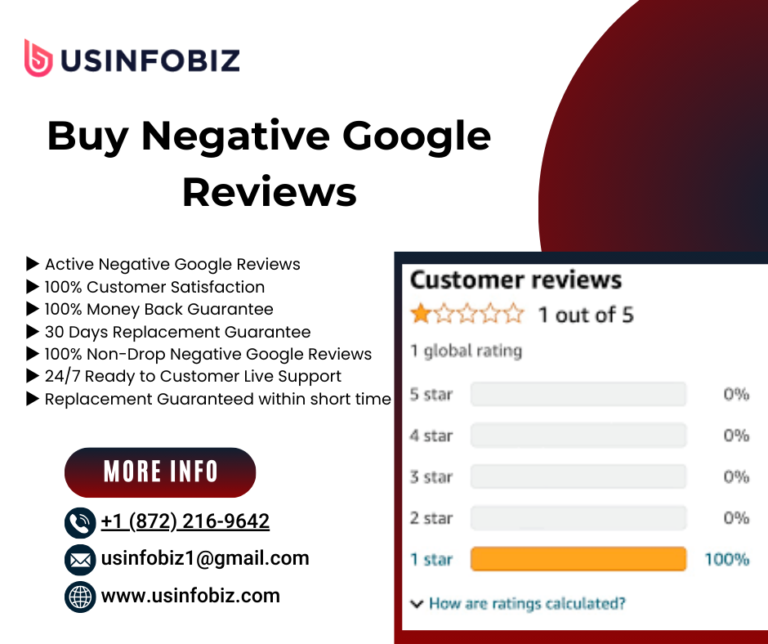Why would someone want to buy negative Trustpilot reviews?
In today’s digital age, online reviews wield immense power. They can make or break a business’s reputation in the blink of an eye. With platforms like Trustpilot serving as a trusted source for consumer feedback, businesses are increasingly aware of how their ratings impact customer decisions. But what happens when some companies resort to less-than-honest tactics? The idea of buying negative Trustpilot reviews might sound outrageous at first, but it’s more common than you think.
Why would anyone want to tarnish their own image intentionally? The answers delve into the murky waters of competition and strategy. Join us as we explore this controversial practice and uncover its potential consequences on brands and consumers alike. From ethics to reputational risks, there’s much to unpack about the dark side of online reviews. Buckle up; it’s going to be an eye-opening ride!
What are the potential consequences of purchasing negative Trustpilot reviews?
Purchasing negative Trustpilot reviews can lead to immediate backlash. Misleading potential customers not only damages credibility but also erodes trust. When consumers discover manipulated feedback, they may distance themselves from the brand entirely. Legal repercussions are another concern. Engaging in deceptive practices could invite lawsuits or fines from regulatory bodies concerned about consumer protection. Companies may find themselves fighting battles on multiple fronts—both legally and reputationally.
The internal culture of a business can suffer as well. Employees who value integrity might feel disillusioned when their company engages in unethical behavior. This loss of morale can translate into reduced productivity and increased turnover rates. Moreover, once a reputation is tarnished, rebuilding it becomes an uphill battle. Negative perceptions tend to linger long after the initial wrongdoing, making recovery challenging for any organization caught in this web of deceit.
How can buying negative Trustpilot reviews impact a business’s reputation?
Buying negative Trustpilot reviews can severely tarnish a business’s reputation. When potential customers see these reviews, they often assume there’s truth behind the claims. This perception can lead to lost sales and diminished trust. The ripple effect is significant. Customers may share their findings on social media or discuss them with friends, amplifying the damage. Word-of-mouth remains powerful, especially in today’s digital age.
Moreover, genuine feedback from satisfied customers can become overshadowed by the artificially created negativity. A few bad reviews might deter even loyal patrons from returning. Trustpilot itself takes these matters seriously and actively investigates suspicious activity. If caught, businesses risk penalties that could further harm their credibility. Attempting to manipulate online perceptions usually backfires more than it helps. The long-term effects of such decisions can haunt a brand for years to come.
What do customers think about businesses that buy negative Trustpilot reviews?
Customers are increasingly savvy when it comes to online reviews. When they discover that a business has engaged in buying negative Trustpilot reviews, their perception can change dramatically. Many see this as a desperate move. It raises red flags about the authenticity of the brand. Customers often question why a company would need to resort to such tactics if their products or services were genuinely good. Trust is crucial in consumer relationships.
If customers find out that a business manipulates reviews, they may feel betrayed and lose confidence. This distrust can lead potential buyers to seek alternatives. Online communities buzz with discussions about these companies, damaging reputations even further. In the age of social media, word spreads quickly, amplifying any negative impact significantly. Consumers prefer transparency and honesty over deception. The fallout from purchasing negative Trustpilot reviews could haunt businesses long after the initial purchase decision is made.
Is it ethical to buy negative Trustpilot reviews for a business?
The ethics of purchasing negative Trustpilot reviews is highly contentious. On one hand, businesses might argue they are merely defending themselves against competitors or highlighting their flaws to improve. However, this reasoning lacks integrity. Buying fake reviews manipulates consumer perceptions and undermines the authenticity that platforms like Trustpilot strive to uphold. Consumers rely on these ratings for honest feedback about products and services. When a business resorts to deception, it erodes trust not just with customers but also within the broader market landscape.
Moreover, engaging in such practices could lead to significant reputational damage if exposed. The potential fallout extends beyond immediate sales losses; it can hinder long-term relationships with loyal clients who value transparency. Ethical considerations demand that businesses prioritize genuine engagement over misleading tactics. Authenticity should be the cornerstone of customer relations rather than a façade built on deceitful reviews.
What are the disadvantages of buying negative Trustpilot reviews?
Purchasing negative Trustpilot reviews can lead to several significant disadvantages for businesses. First, it undermines trustworthiness. Customers rely on genuine feedback when making decisions. Fake negativity creates skepticism. Second, there’s a risk of exposure. Review platforms have mechanisms to detect fraudulent activity. If caught, companies may face severe penalties or removal from the site entirely. Additionally, buying negative reviews can backfire by attracting unwanted attention.
Competitors and customers alike might call out the dishonesty, damaging the brand further. Moreover, this approach diverts focus from addressing real issues within the business itself. Instead of improving products or services based on honest feedback, resources are wasted on deceptive tactics. Consumer backlash is a real threat; people value transparency and authenticity more than ever before. Once trust is shattered due to unethical practices like these, rebuilding it becomes an arduous journey fraught with challenges.
Can businesses recover from the damage caused by purchasing negative Trustpilot reviews?
Recovering from the damage caused by purchasing negative Trustpilot reviews is challenging, but not impossible. The first step is acknowledging the mistake. Transparency can help rebuild trust with customers who may feel betrayed. Once a business admits to its misstep, it should focus on improving its service or product quality. Authentic customer engagement and addressing past issues are crucial for regaining credibility. Another effective strategy involves generating genuine positive feedback.
Encouraging satisfied customers to leave honest reviews can drown out previous negativity over time. Companies must also monitor their online reputation closely. Quick responses to any new negative comments demonstrate commitment and accountability. Consistent branding efforts that emphasize integrity play a vital role in winning back consumer confidence. Trust takes time to build, but with dedicated effort, businesses can gradually turn things around after such setbacks.
How do fake negative Trustpilot reviews affect consumers?
Fake negative Trustpilot reviews can significantly mislead consumers. When potential customers read these deceptive reviews, they often form an unfair perception of a business. They might avoid services or products that could have genuinely met their needs. Moreover, these fraudulent comments create distrust in the review system as a whole. Consumers may become skeptical about all feedback, unsure about what’s real and what isn’t. This undermines authentic voices trying to share genuine experiences.
As buyers navigate through this web of misinformation, they risk missing out on quality offerings. Their purchasing decisions are tainted by manipulative tactics designed to harm competitors rather than provide honest insight. The emotional impact shouldn’t be overlooked either. Customers may feel frustration and confusion while trying to discern valid opinions from misleading ones, complicating their decision-making process further.
Why do businesses resort to buying negative Trustpilot reviews?
Businesses may feel compelled to buy negative Trustpilot reviews for various reasons. Some believe that by doing so, they can create a false narrative about competitors or distract from their own shortcomings. In highly competitive markets, companies might think that flooding the review platform with unfavorable feedback about rivals will sway potential customers. It’s a misguided strategy aimed at gaining an unfair advantage.
Others might resort to this tactic in hopes of making their own positive reviews seem more credible. By balancing out glowing testimonials with some negativity, they aim to appear authentic and trustworthy. Desperation can also drive businesses down this path. When faced with dwindling sales or mounting pressure, some leaders make hasty decisions that compromise ethical standards in pursuit of short-term gains.
What are the ethical implications of manipulating Trustpilot reviews?
Manipulating Trustpilot reviews raises significant ethical concerns. It undermines the integrity of feedback systems designed to help consumers make informed decisions. When businesses choose to distort their online reputation, they prioritize short-term gains over honesty. This practice can erode trust in not only the business involved but also in the platform itself. Customers rely on these reviews for genuine insights; deception ultimately misleads them. Additionally, such manipulation may lead to unfair competition.
Companies that engage in this behavior gain an undeserved advantage over honest competitors who strive for transparency and authenticity. Moreover, it poses moral questions about accountability. Businesses have a responsibility to foster trust with their customers rather than exploiting vulnerabilities through false narratives or misleading information. Engaging in review manipulation reflects poorly on a company’s values, setting a dangerous precedent within the industry.
How can consumers differentiate between genuine and fake Trustpilot reviews?
Consumers can spot genuine Trustpilot reviews by looking for detailed feedback. Authentic reviews often provide specific experiences, highlighting both positive and negative aspects of a product or service. Beware of generic language. Reviews that lack personal anecdotes or seem overly promotional might be fake. Repetitive phrases across multiple reviews can also raise red flags. Check the reviewer’s profile too. Genuine users typically have a history of various reviews across different businesses.
Profiles created solely to post one glowing review are suspicious. Look at the overall sentiment as well. If most reviews are overwhelmingly positive with only a few negatives, it could indicate manipulation, especially if those negative ones sound similar in tone. Trust your instincts. If something feels off about a review—whether it’s the wording or emotional resonance—it’s worth digging deeper before making any decisions based on that feedback.
What measures can Trustpilot take to combat the purchase of negative reviews?
Trustpilot can implement several measures to combat the purchase of negative reviews. One effective approach is enhancing their algorithms to detect patterns indicative of fraudulent activities. By analyzing review frequency, language consistency, and user behavior, Trustpilot could identify suspicious accounts more easily. Another strategy involves increasing transparency around review sources. Encouraging users to verify their identities before posting reviews would deter malicious actors from submitting fake feedback.
Additionally, implementing stricter penalties for businesses caught engaging in review manipulation could serve as a strong deterrent. Publicly disclosing such actions might discourage others from considering similar unethical practices. Educating consumers about recognizing authentic reviews versus manipulated ones is equally vital. This empowers them to make informed decisions and fosters a culture of genuine feedback within the platform. Fostering community reporting features allows vigilant users to flag potentially false or harmful reviews promptly, creating an environment that values integrity over deceitful tactics.
What are the long-term effects of buying negative Trustpilot reviews?
Buying negative Trustpilot reviews can have lasting repercussions for a business. Initially, it might seem like a quick fix to undermine competitors or boost perceived credibility through manipulation. However, over time, the truth often surfaces. Customers are becoming more discerning and adept at spotting fake reviews. This realization can lead to diminished trust in brands that engage in such tactics. The fallout from these actions isn’t just reputational damage; it may also result in lost sales.
Consumers tend to gravitate toward transparent businesses that prioritize honesty and integrity. Additionally, companies risk drawing scrutiny from review platforms like Trustpilot itself. Getting flagged can impact overall ratings or even lead to account suspension. The pursuit of immediate advantages through deceitful means rarely pays off long-term. A tarnished reputation takes years to rebuild while authentic relationships with customers build loyalty and trust instead.
In what ways can businesses build trust without resorting to buying fake reviews?
Building trust organically is essential for any business. One effective way is through transparency. Sharing detailed information about products and services helps customers feel informed. Engaging with customers on social media fosters a sense of community. Responding to inquiries and addressing concerns shows that the business values customer input. Encouraging genuine feedback from real customers can also enhance credibility. This creates a culture where reviews reflect actual experiences, rather than fabricated ones.
Additionally, highlighting positive case studies or testimonials reinforces trustworthiness without manipulation. These stories resonate more because they are relatable and authentic. Offering exceptional customer service can lead to word-of-mouth referrals, another powerful trust-building method. Happy customers become brand advocates naturally, sharing their experiences with others. Investing in quality assurance ensures that products meet high standards consistently, which can lead to improved satisfaction ratings over time without resorting to deceitful practices.
Should Trustpilot implement stricter measures to prevent the buying of negative reviews?
Trustpilot plays a crucial role in shaping consumer perceptions. With the rise of businesses looking to buy negative Trustpilot reviews, the platform faces challenges that could undermine its credibility. Stricter measures could include enhanced verification processes for reviewers. This would help ensure that feedback is genuine and not manipulated for competitive advantage. Incorporating advanced algorithms to detect patterns indicative of fraudulent behavior can also be beneficial.
By identifying suspicious review activities, Trustpilot can maintain its integrity as a reliable source. Moreover, educating consumers about recognizing fake reviews is vital. Transparency around how reviews are generated may empower users to make informed choices. While some safeguards exist, strengthening them could bolster trust among users and improve overall business accountability on the platform.
Conclusion
The issue of buying negative Trustpilot reviews is complex and fraught with risks. Businesses may initially think that such a tactic could give them leverage over competitors or manipulate their online reputation. However, the potential fallout far outweighs any short-term benefits. Consumers today are savvy. They can often spot inauthentic reviews from a mile away. Purchasing negative feedback not only harms trust but also raises ethical questions about the integrity of business practices. Authenticity matters more than ever when it comes to customer relationships. Long-term damage can include loss of credibility, potential legal ramifications, and diminished customer loyalty. Building an honest brand image takes time and effort—qualities that can’t be shortcut by resorting to deceitful tactics like buying fake reviews.
Fostering genuine connections with customers through quality service will always serve businesses better than attempting to game the system for quick wins. Embracing transparency and accountability ultimately leads to stronger reputations and sustainable growth in today’s digital landscape. As platforms like Trustpilot evolve, they must continue developing measures to mitigate these unethical practices while consumers become increasingly aware of what constitutes genuine feedback versus manipulation efforts. True success lies in cultivating real experiences rather than fabricating them for appearances’ sake.
If you want to more information just contact now.
24 Hours Reply/Contact
Telegram: @usinfobiz
Skype: usinfobiz
WhatsApp: +1 (872) 216-9642


